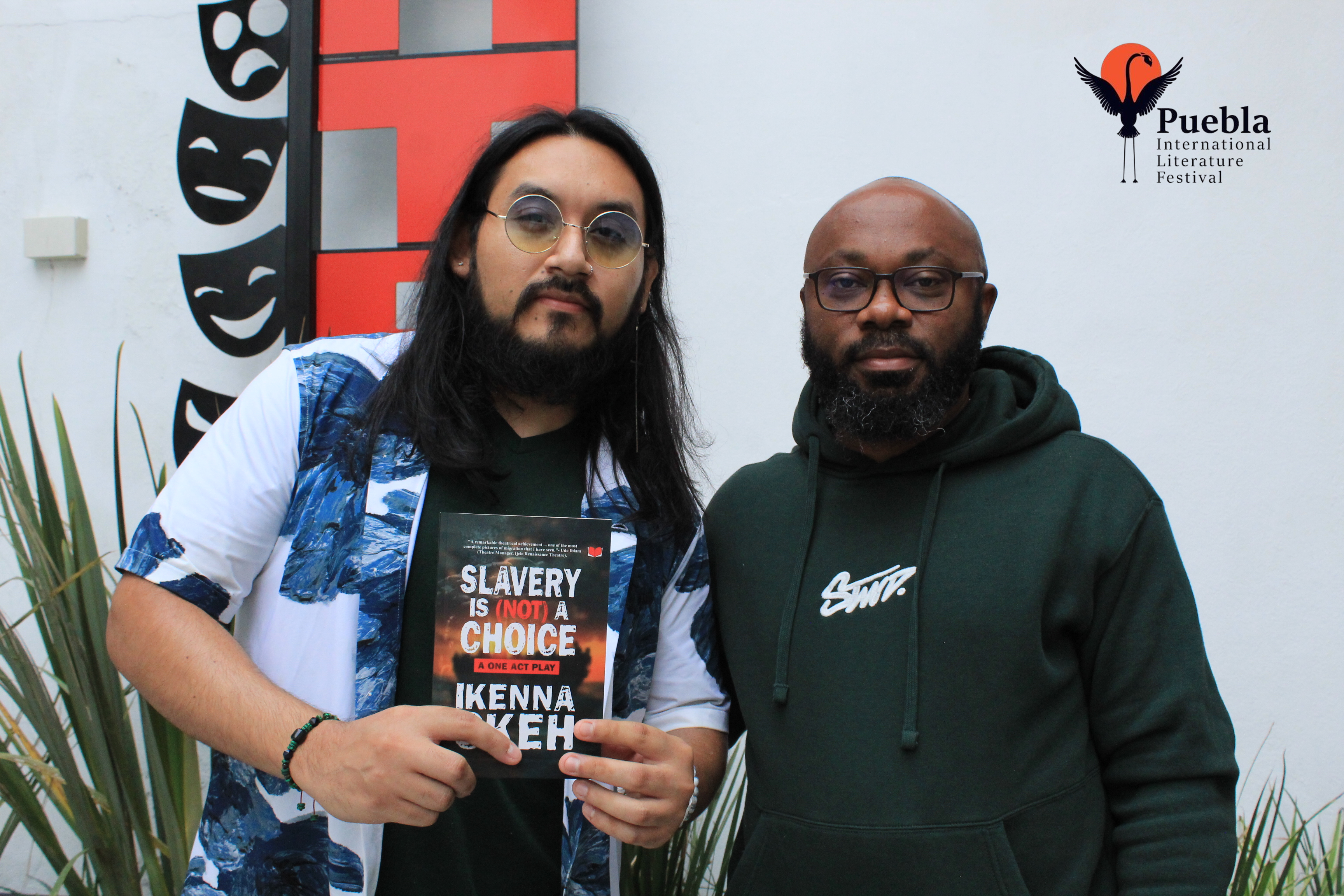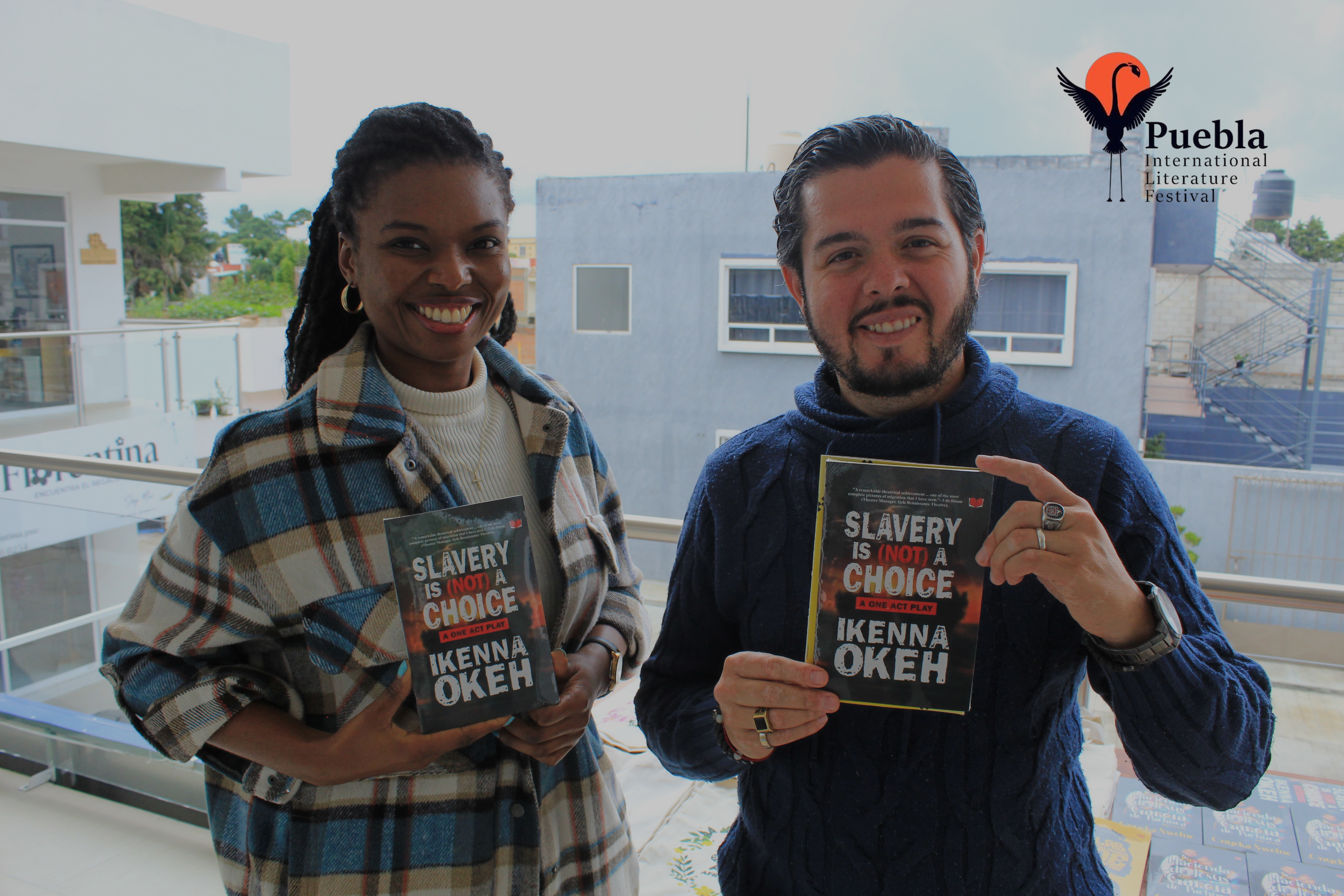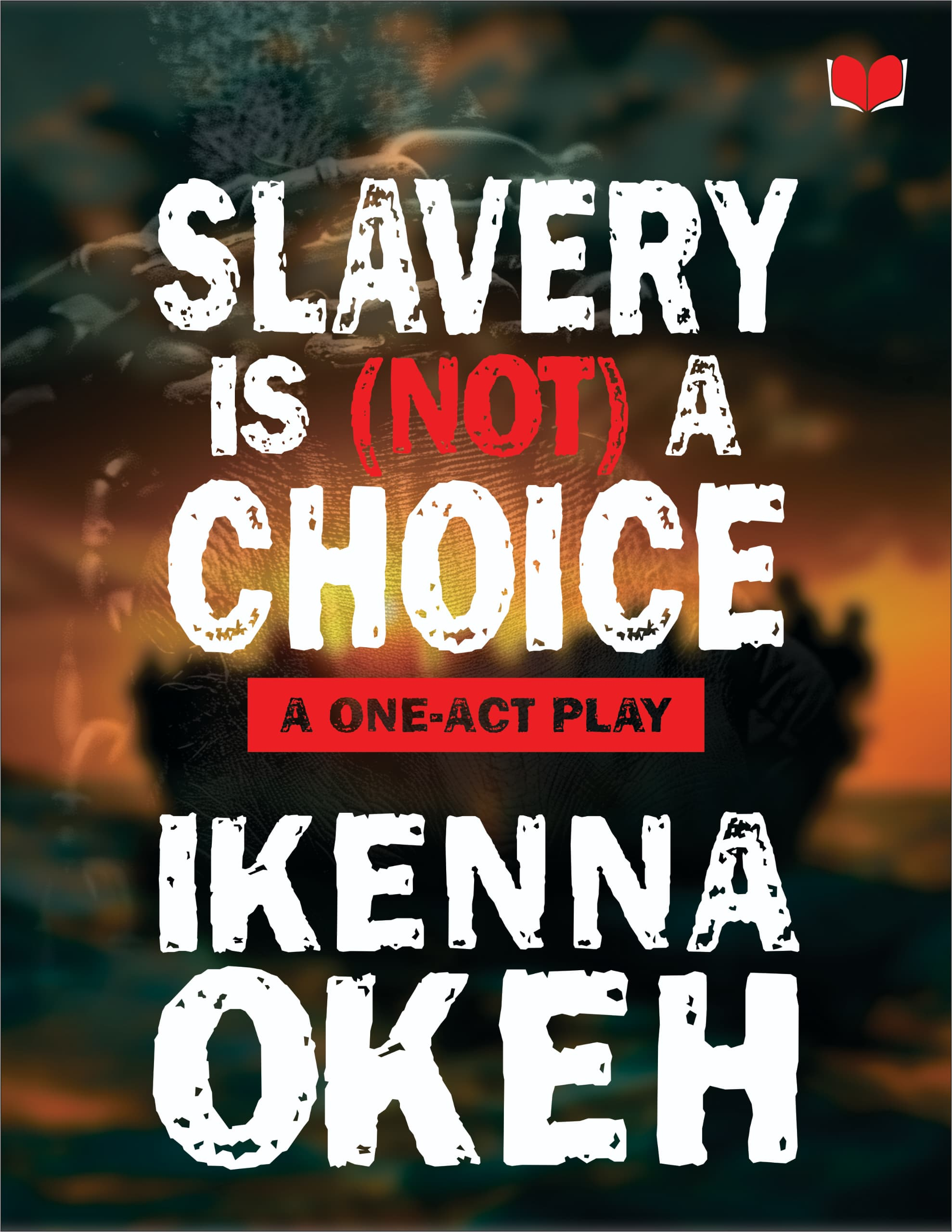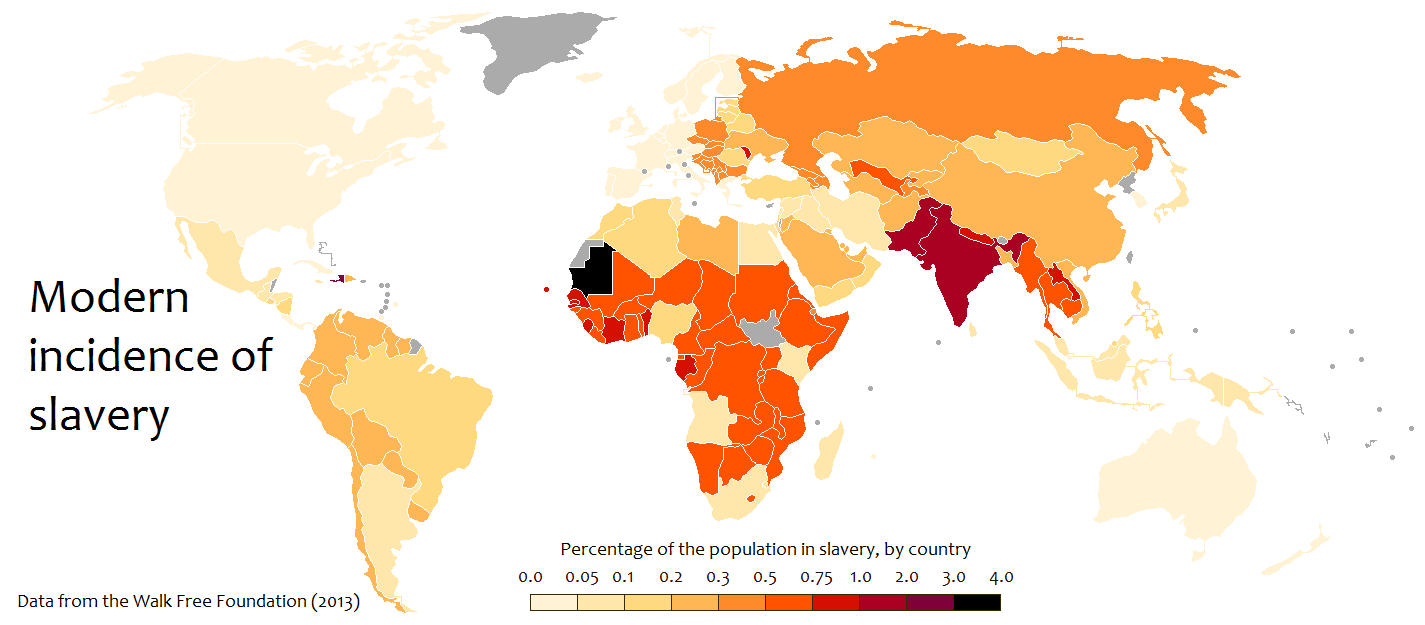Slavery is (Not) a choice is Ikenna Okeh’s latest stage play presentation. The title takes its courageous nuance of confrontation from the now notorious and befuddled outburst of famous American rapper Kanye West, who declared to the outrage of most people of good conscience that ‘slavery was a choice’ for the victims.
In this thought-provoking one-act play which reverberates with well-calculated waves of sensibilities quite appropriate for the grim subject matter, Okeh creatively and covertly presents reparation as the elephant in the room of the global discussion on slavery, the silent currency of resolving the trauma of the trans-Atlantic slave trade in the African collective mind.
There is no point assuming that there is no connection between the four characters on this road of return and the four days of the ethnic Igbo week
The action is centered in the heartland of the Igbo ethnic group in Eastern Nigeria, on a lone and pregnant forest road. The central theme is not openly discussed, but converges on the fate of the characters just as they meet by chance on the same forest road along which they are all returning, each to his own home community, from encounters with international slavery. In one form or the other, they have all been victims of this global abominable trade, and having escaped, they all long to get home, with differing visions of what the returning now has in store for them. ‘I am finding my way home,’ declares Zunga. And in essence they all are.
There is no point assuming that there is no connection between the four characters on this road of return and the four days of the ethnic Igbo week since the four represent all victims from all African ethnic and tribal groups involved, and wherever the victims may have originated, the four days encountered and recorded them all, in the eternal mind of time. No victim is left out in the annals of the abomination and in the quest of seeking resolution for the collective trauma. The characters meet as strangers, but they are kin and blood of the same outrage, different twigs floating home after the same forest storm.
The fifth character ... Jonas, is cut from the same fabric as Kanye West in that obnoxious outburst.
But the fifth character is different. Jonas is cut from the same fabric as Kanye West in that obnoxious outburst. There are two key and pivotal participants in the shame being exposed by Okeh, Africans on the continent and European slavers. Jonas is that African. Yeah. By juxtaposing the perspectives of these two groups, the play uncovers the multifaceted implications of slavery, responsibility, and the quest for justice, skillfully navigating the moral quagmire that ensues when historical injustices are confronted. Yet Jonas is unrepentant, actively canvassing to our four escapees with more deception for more captivity enshrouded in bright promises of the greener grass overseas, a dark foreshadowing of the massive bleed of modern brain drain from Africa to Europe and America for which the ex slave masters currently have no answers, or answers better than confusion, cruelty and history revisionism.

The play's strength lies in its rich characterization. The four returnee characters embody a spectrum of responses to the legacy of slavery and express deep anger and betrayal, like Fuba did. He has been forced to the den of the Long Juju in Arochukwu, to the cave complex of the Supreme deity Ibinu Ukpabi, to face trial by ordeal for killing a man in a bout of drunken frenzy. If he crawls through the cave of no return and comes out alive, he is innocent. If he is guilty the fearsome deity will eat him alive. He shakes his head at the horrid memory of his capture and says: ‘You can imagine the horror of it.’ And it is not hard to do.
Zunga grapples with a nuanced sense of identity shaped by the historical trauma in question. For him, he had to go into slavery to redeem a family debt. And without this sacrifice, his heritage will be ruined. ‘Can you imagine something like that befalling any family? Our ancestors would have mourned us, and generations to come would have cursed the memory of us for all eternity. So, as the second eldest, I offered to go…’
This multiplicity of voices and perspectives provides authenticity to Okeh’s narrative, showcasing the varied ramifications of slavery on the African psyche. Conversely, the European characters are not revealed, their foul contribution only referred to and implied, their own guilt long since established. This dual perspective refrains from a simplistic rendition of the trauma in display, instead it offers a nuanced portrayal of complicity, guilt of tradition, and the difficulties in confronting historical legacies. It is against this nuanced portrayal of the characters and their background that the silent argument for reparation is made. The argument is blunt. Yes, you cannot argue your innocence from another’s involvement.
The argument is blunt.
Slavery is (Not) a Choice effectively challenges audiences to confront not only the historical realities of slavery but also the ongoing repercussions of such injustices. The characters trigger sensibilities that reflect contemporary debates about slavery and reparation, making it relevant to modern discourse and in this way emphasizes the complexity surrounding effective restitution.
Now to symbolism. Symbolism plays a pivotal role in the narrative structure of the play and Okeh employs metaphoric imagery throughout its dialogues and settings, illuminating the scars of history that linger on both sides. The recurring motif of return—both literal and metaphorical—serves as a haunting reminder of a past that proved inescapable for most and thus binds the characters in redemption-and resumption-of purpose. In their encounter on the forest dirt road, the chains are no longer visible on their feet. But it hangs around the lost steam of potential to which their return reconnects to new visions and new dreams for the home land that now requires a reframing. And this reframing symbolizes the legacy of oppression that both Africans and Europeans must grapple with, linking their fates in a shared history of suffering and complicity – with responsibility. The reality is that despite the slight complicity involved, the slave trade remained a one sided affair in which human beings were traded for hand mirrors and umbrellas. And this one sided exploitation has continued for over a century now, post slavery.

In structure the play's one-act format heightens the intensity of its thematic exploration. The concise structure compels the dialogue to be sharp and impactful, forcing each character's perspective to resonate without superfluous exposition. And at one point, all five of them held attention at the same time on stage. The rapid pacing occasionally veers into oversimplification, risking overly didactic moments where subtlety is sacrificed for the sake of clarity. But this is needed, for the emotional weight conveyed through powerful exchanges manages to evoke the necessary contemplation among the audience.
Slavery is (Not) a Choice successfully engages its audience in a meaningful dialogue surrounding the legacy of slavery and the pathways toward reparative justice. Through its comparative review of the circumstances and analysis of African and European roles, the play challenges viewers to rethink historical narratives that cannot be allowed to fall to revisionism. The point of a character like Horsefall, an ex-slave who rose to importance, like King Jaja of Opobo, is not sit back and play victim. He has a clear cut practical vision of what his return means. Slavery has bandied him around. Yes. But like Olaudah Equiano this horrid experience has also imbued in Horsefall, a new sense of that purpose that drove Equiano. His slave name Horsefall, non ancestral as it is, is nevertheless injected with the formidable energy of the home gods that once ruled the forests of the stage and its penetrative dirt road. He is already on his way home and when he finally arrives there is no dilly-dallying around what the new dawn means to him for the free ones he is going to meet at home. ‘I will teach them how to trade in palm oil and palm kernels,’ Horsefall declares. ‘We will find our way to the merchants from across the great ocean. We will make wealth. And from the wealth we will build a society that great and curious men from all over the world will come to see for themselves, for the story of us will be the subject of epic tales and songs to be sang and narrated in the halls of kings and princes. We will be called the greatest, the most advanced, the shining light of our kind. The might and strength of Africa. The prized jewel of the modern world.’
The play challenges viewers to rethink historical narratives that cannot be allowed to fall to revisionism.
This powerful and moving vision of an unconquered spirit returning to the place where it was despoiled and dehumanized, shows Okeh at the apex of his creative exuberance. The excitement of the vision in the vision is addictive. You can feel it. It draws you in to its warming optimism, its rising crescendo of impending triumph and its elevated shriek of recovered potential. This is the kind of triumph over trauma that does not wait to stand with begging bowls. At the end of the day, it is just a reconnection of what should have been with what must now be. And this profound and new becoming, in a nutshell; this returning to become even greater things, is what makes Slavery is (Not) a Choice the radiant acclaim for resolution that it really is.
'Slavery is (Not) a Choice' is available on Amazon and in Nuria Bookstore Kenya.

